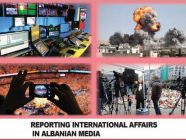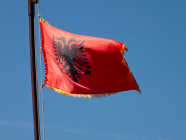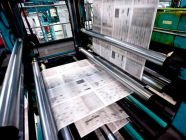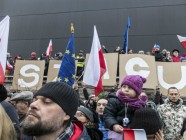A new study from the Open Society Foundation for Albania (OSFA) provides an in-depth picture of the discourse between the main political leaders and newspapers in Albania. The OSFA report analyzes the discourse of two main political figures, Prime Minister Sali Berisha (Democratic Party) and the Socialist Party Chairman Edi Rama, as well as five major Albanian newspapers (Panorama, Shekulli, Gazeta Shqip, Mapo and Gazeta Shqiptare). The working group sought to analyze how Sali Berisha and Edi Rama describe each other – by personality, achievement, or ideology. In addition the study sought to discover to what extent the discourse of each actor, political leader, and newspaper, match their respective ideologies, be it leftwing or rightwing. Lastly the study examined how women, religion and minorities, EU integration, and institutions are treated in the discourse between political leaders and newspapers. The analysis took place during two periods, beginning three months before and continuing three months after the 2009 and 2011 elections. The study was conducted using contemporary methods and software for content analysis (KWIC and Yoshikoder 7.4). To examine the public discourse between the two political leaders, the working group assessed all official declarations disseminated by their respective press offices during the study period.
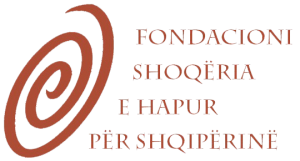 Using descriptive words found in the texts, a codebook of three categories was created, including character, performance, and affiliation. Each category contained descriptive words used by the two political leaders, which yielded the finding that no “positive” reference was made towards either candidate during the study period. Furthermore, the negative discourse of the leftwing Socialist leader towards the current Prime Minister (and rightwing Democratic leader) increased from 2009 to 2011. Overall, 50 percent of the negative discourse included performance-based criticisms, which referred to the fulfillment of their public functions, with the rest being character-based criticisms or associations with negative connotations. The study also revealed that all negative discourse peaked immediately before and after elections.
Using descriptive words found in the texts, a codebook of three categories was created, including character, performance, and affiliation. Each category contained descriptive words used by the two political leaders, which yielded the finding that no “positive” reference was made towards either candidate during the study period. Furthermore, the negative discourse of the leftwing Socialist leader towards the current Prime Minister (and rightwing Democratic leader) increased from 2009 to 2011. Overall, 50 percent of the negative discourse included performance-based criticisms, which referred to the fulfillment of their public functions, with the rest being character-based criticisms or associations with negative connotations. The study also revealed that all negative discourse peaked immediately before and after elections.
To analyze the ideological compatibility of each leader and newspaper (rightwing and leftwing), the study began by utilizing existing literature from Michael Laver and John Garry who organize rightwing and leftwing vocabulary into categories, including “institutions, law and order, environment, socio-economic matters, and value.” Ultimately the conclusion was drawn – with the exception of the environment and to a certain extent the institution – that the rightwing lexicon dominates the discourse of both leaders and newspapers. This does not necessarily imply that a subject is rightwing – rather the study allows researchers to determine whether or not the documents contain a large portion of typical rightwing vocabulary, which may be due to the document actually being rightwing, or because it contains criticisms of rightwing discourse. Nevertheless, leftwing discourse is largely scant of leftwing lexicon. In the case of the leftwing leader Rama – using the relatively small amount of left discourse in comparison to right discourse, and to the degree that it can be observed in speech – discourse tends to be more critical than constructive. The study provides important conclusions on political discourse concerning religious, minority, and women’s groups. Concretely, there has been a rise in discourse on violence perpetrated against women, and there is no offensive discourse towards minorities. Women’s issues are more frequently discussed by the Socialist Party leader, especially in regards to political representation and violence, while the rightwing Democratic Party leader speaks more of religion and minorities. Unlike political figures, almost none of the newspapers discussed support for women’s political representation with the same frequency as they discussed more general equality issues.
The EU and Europe in general appear to be a high priority in the discourse of all – including both political leaders and newspapers. But while the EU is frequently discussed, discourse on specific EU integration-related reforms is very low, with the exception of electoral and justice reforms. OSFA’s research study also analyzes discourse on institutions, finding that criticisms of institutional integrity, as well as defiant or threatening language towards institutions, have become more pronounced, both in newspaper coverage and directly from the Socialist leader in opposition, Rama. In contrast, discourse from the Democratic leader in power Berisha has risen only in regards to the defiance and threats category. It is very telling that both opponents – Rama and Berisha – either defy and threaten institutions, or accuse each other of doing so. In regards to the so-called “positive” categories concerning the discursive treatment of institutions, (where the working group has listed potentially appreciative words on institutions) the study cannot provide concrete conclusions. The methodology used does not allow for a distinction between promises for higher integrity and better functioning, or criticisms. However, when taking into account that a few of these words are in fact criticisms on the functioning and integrity of institutions, the main conclusion is further supported – in Albania, discourse on institutions is mainly and predominantly negative, especially in regards to integrity.
The report is available here.
Article translated from the original Albanian “Karakteristika të ligjërimit politik në Shqipëri”.
Tags: Albania, Albanian media, Albanian political system, OSFA, Sali Berisha


